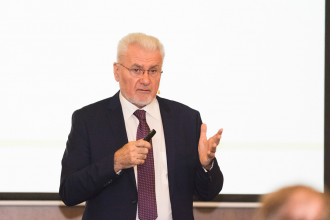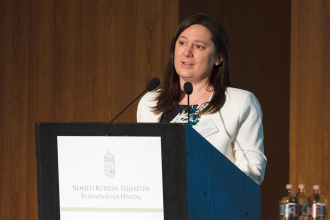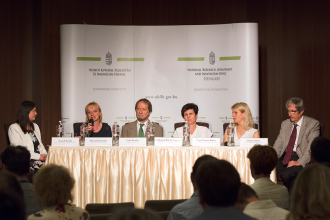At the end of May the European Commission published its in-depth interim evaluation of the H2020 framework programme aimed at promoting excellence which provides funding directly accessible through international competitive calls and which receives 30,000 RDI project proposals every year from European applicants. The document highlights the innovative funding model of the ELI laser research infrastructure, the Szeged-based facility of which was delivered in May 2017. The successful Hungarian participation was greatly facilitated by the network of National Contact Points coordinated by the NRDI Office and the national funding schemes financed by the NRDI Office.
To share the experience of successful applicants and H2020 evaluators and also to discuss lessons to be learned from the interim evalutaion, the NRDI Office organised an event titled “RDI Calls Review: H2020 Forum for Applicants and Evaluators”. The event was open to all concerned, with its presentations and round-table discussion livestreamed on our website.
|
|
||||
|
|||||
In terms of funding awarded under the Horizon 2020 framework programme Hungary is ranked at the 19th place among participating EU Member States. Since EUR 23 million was awarded to Hungarian researchers under the H2020 programme so far, the document also acknowledges that Hungarian applicants received more grants from the research excellence calls of the European Research Council (ERC) than would have been expected based on national RDI investment ratio, compared to the rest of the countries.
Concerning all Horizon 2020 grants, by institution type, domestic businesses had the highest success rate: 34% of won by Hungary was going to businesses, 33% to higher education institutions and 26% to research institutions.Among Hungarian universities, the list of “best H2020 performers” is topped by Semmelweis University in terms of the volume of grants and by the University of Debrecen in terms of the number of funded organisations.
Most of the funds won by Hungarian applicants were awarded in the following fields: “Information & Communication Technologies” (EUR 16 million), “Food Security, Sustainable Agriculture and Forestry ...” (EUR 15 million) and “Smart, Green and Integrated Transport” (EUR 9.9 million). Hungarian small- and medium-sized enterprises have already won around EUR 19 million in funding under the so-called “SME Instrument” fostering the development and international commercialisation of innovative solutions and services. On the “Phase 2” calls of the SME Instrument targeting the development stage of products and technologies Hungary outperformed not only the rest of EU13 but even some EU 15 countries (old Member States), such as Austria, Belgium, Greece or Luxemburg.
The document mentions the ELI laser research infrastructure in Szeged as a positive example, the preparation and construction of which was financed in an innovative funding model using the combination of the Structural Funds, FP7 and H2020 funds and national funds. This funding model is praised in the interim evaluation also because the strengthening of synergies between the Structural Funds and H2020 funds i.e. the combined and mutually supportive utilisation of these funds is seen as a key challenge in the following period, since only little progress has been achieved in this respect so far.
The H2020 interim evaluation can be downloaded at the European Commission’s website.
--------------------------------------------------------------------------
National Research, Development and Innovation Office
The National Research, Development and Innovation Office, which is responsible for the appropriate, efficient and transparent utilisation of domestic RDI funds, developed a uniform system of competitive calls in 2015 for the coordinated, appropriate and value-creating utilisation of EU development funds provided for RDI purposes and the domestic sources provided from the National Research, Development and Innovation Fund (NRDI Fund). The coordinated calls in the portfolio incentivise scientific research projects, business developments and the implementation of innovative ideas alike. The Office is responsible for providing professional background to RDI projects funded from EU sources – Economic Development and Innovation Operational Programme (EDIOP) and Competitive Central-Hungary Operational Programme (CCHOP) – and for preparing the concept of calls for applications from an RDI policy perspective. The total funding available for research, development and innovation until 2020 is HUF 1,200 billion, provided from EU and domestic sources in the framework of calls announced in cooperation with the NRDI Office.









